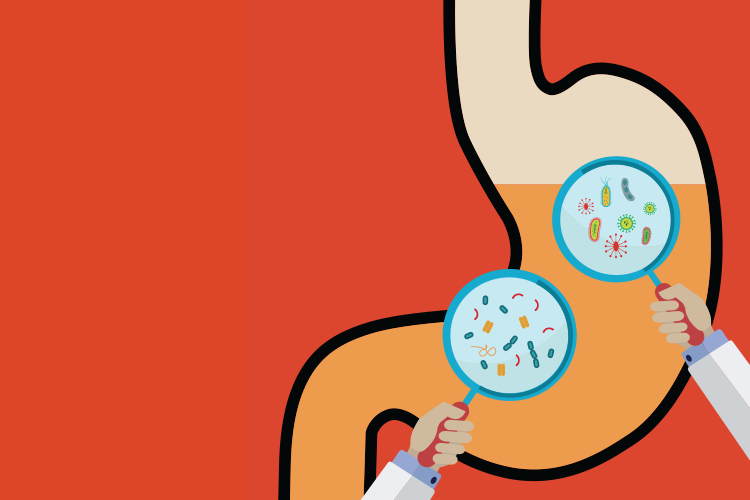Blog
Type 2 diabetes and the microbiome
 Our gut bugs have a lot to say about our state of health and wellbeing!
Our gut bugs have a lot to say about our state of health and wellbeing!
The importance of the health of the human microbiome is a growing area of research, and found to be implicated in a multitude of health and disease processes, and body system function.
Research is suggesting a link between what is going on in the intestinal microbiome and triggering type 1 diabetes, activated via the immune-gut pathways. Now, there may be a link between our gut bugs and risk of developing diabetes of the type 2 variety.
The study
In order to assess whether the state and balance of the intestinal microbiome influenced metabolic and cardiovascular health, a team of researchers at the University of Copenhagen and the Technical University of Denmark analysed the action of insulin of 75 people with type 2 diabetes, and 277 people without, as part of the MetaHit research project.1
1200 metabolites were monitored in blood samples, alongside DNA-based assessment of the microbes the reside in the human intestine.
What the researchers found was an imbalance in particular gut microbes that may contribute to insulin resistance.
“We show that specific imbalances in the gut microbiota are essential contributors to insulin resistance, a forerunner state of widespread disorders like type 2 diabetes, hypertension and atherosclerotic cardiovascular diseases, which are in epidemic growth,” said lead author of the study, Professor Oluf Pederson.
The outcomes
Specifically, the researchers discovered:
- Higher levels of branched-chain amino acids in the blood were associated with certain functions and the composition of the intestinal microbiota
- One function included production of the high amounts of branched-chain amino acids, synthesized by the Prevotella copri and Bacteroides vulgatus gut bacteria
- Higher levels of branched-chain amino acids were found in the blood of those with decreased sensitivity to the action of insulin
- When mice were fed Prevotella copri for 3 weeks, they experienced higher levels of branch-chain amino acids, glucose intolerance and insulin resistance than those not fed the bacterial strain.
Phew! That is pretty big. Discoveries like this can inform future studies as to whether dietary changes may affect whether the Prevotella copri species flourishes or is out-competed by a more helpful strain, or whether some other kind of pharmaceutical or probiotic treatment may be used in part as management for insulin resistance.
It is another piece to the complex puzzle of understanding the factors that drive insulin resistance, alongside lack of exercise, poor diet, or weight.
But we can hypothesise there may be a connection between the poor diet associated with risk of insulin resistance and type 2 diabetes, and the influence a poor diet can have on the state of our gut bugs, right?
A diet that is rammed with heavily refined and processed versions of sugars, grains and meats, for example, does not help either situation.
What does this mean for us?
There are a myriad of reasons as to why the composition, and balance, of gut microbiota differ from person to person. Factors may include the state of the maternal microbiome, early-infant feeding practices and microbial composition of breast milk,2-4 as well as environmental factors like high or early antibiotic use.
However, there is general consensus that a diet high in heavily processed foods whilst low in fibre and diversity does not promote happy gut bugs; whereas eating a load of vegetables is good not only for gut health, but all health.
So, want to encourage the flourish of some good gut times? Tend to your gut garden with real whole foods that include fibre, prebiotics and probiotics, avoid refined and heavily processed stuff, and you are off to a good start. Check out our microbiome down-low for more!
And find out more on the MetaHit research project here 🙂
By Angela Johnson (BHSc Nut. Med.)
References:
- Pedersen, HK, Gudmundsdottir, V, Nielsen, HB, Hyotylainen, T, Nielsen, T, Jensen, BH, Forslund, K, Hildebrand, F, Prifti, E, Falony, G, Le Chatelier, E, Levenez, F, Doré, J, Mattila, I, Plichta, DR, Pöhö, P, Hellgren, LI, Arumugam, M, Sunagawa, S, Vieira-Silva, S, Jørgensen, T, Holm, JB, Trošt, K, Consortium, M, Kristiansen, K, Brix, S, Raes, J, Wang, J, Hansen, T, Bork, P, Brunak, S, Oresic, M, Ehrlich, SD, & Pedersen, O 2016, ‘Human gut microbes impact host serum metabolome and insulin sensitivity’, Nature, [Epub ahead of print]
- Festi, D, Schiumerini, R, Eusebi, LH, Marasco, G, Taddia, M, & Colecchia, A 2014, ‘Gut microbiota and metabolic syndrome’, World Journal Of Gastroenterology, vol. 20, no. 43, pp. 16079-16094.
- Garcia-Mantrana, I & Collado, MC 2016, ‘Obesity and overweight: Impact on maternal and milk microbiome and their role for infant health and nutrition’, Molecular Nutrition & Food Research(Epub ahead of print).
- O’Sullivan, A, Farver, M, & Smilowitz, JT 2015, ‘The Influence of Early Infant-Feeding Practices on the Intestinal Microbiome and Body Composition in Infants’, Nutrition And Metabolic Insights, vol. 8, no. Suppl 1, pp. 1-9.











